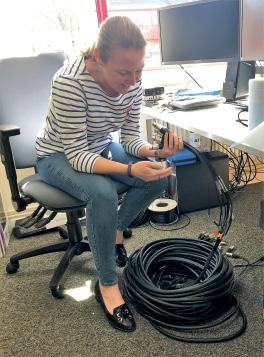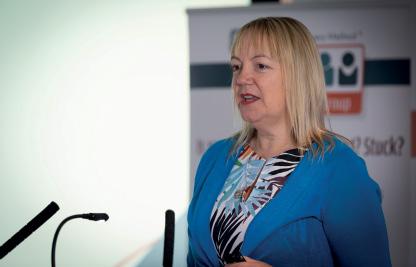The ICCM Journal | Summer 2020 | V88 No. 2
21
grief in a pandemic How you can help protect yourself emotionally
There’s been a lot of talk in the media about the “frontline” in this pandemic mostly focussed on the unfolding challenges in the NHS and not for the first time a whole, highly significant group of people have been ignored - you – which is why I was thrilled to be asked to write this article. I’m Carole Henderson, Managing Director of Grief Recovery Europe. You may have seen me speak at a couple of the ICCM conferences – I help people move beyond death, divorce and other losses using The Grief Recovery Method. This happens to be the only evidence-based grief programme in the world. I know from my work with thousands of bereaved people the key role the funeral plays in the healing process. I also know the scale of the impact when something goes wrong or fails to happen in that process. In Grief Recovery we define grief as the conflicting feelings following a change or end in a familiar pattern of behaviour. A definition which very neatly sums up the situation we all find ourselves in right now. When I say conflicting, I mean having both positive and negative feelings all at once and why grief can feel so overwhelming. Normally we feel one thing at a time – angry or frustrated or happy or relaxed so when we feel lots of different things within the space of minutes or seconds it is very different. It might be for example that 1 minute you’re proud to be able to do your bit in helping people be buried or cremated with dignity and respect and the next minute scared stiff that doing your job might expose you to a potentially lethal disease with the evidence of that potential right there at work! So, you might find it helpful to know that what you are experiencing emotionally right now is genuine grief. A completely normal and natural response to loss of any kind. This includes loss of normality, loss of safety, loss of confidence as well as all the other loss you may more usually think of as a grief event such as a personal bereavement. We are all in the same boat but we are all experiencing the storm differently. We are all unique and so our grief is unique. You or your colleagues may be having to deal with these exceptional work challenges on top of trying to look after elderly parents or worry about them in their care home. You may have been bereaved, experiencing marital breakdown, be watching your teenage children come to terms with their exams being cancelled. Everyone has their own challenges which is why
Carole Henderson
so much of the “advice” can seem irrelevant or even patronising. Living Through Lockdown, a 5-Point Plan We’ve tried to come up with some practical tips you can use no matter which boat you’re sailing. The plan is published in greater detail on our website if you want to read more on this. 1. 2. 3. 4. 5.
Acknowledge everything Be present Be emotionally honest Have an open heart Say goodbye
1. Acknowledge Everything If you are feeling scared right now, think about what you can do about it. The answer is probably nothing. Just acknowledge it, say to yourself ‘Ok, I’m feeling frightened, and that’s perfectly normal.’ If you’re feeling sad, or frustrated, acknowledge it and let it go. If you’re struggling to get past your feelings once you’ve acknowledged them, have a shower, get dressed or go for a walk. The easiest way to explain this is thinking of a trip to an aquarium. In the first tank, a shark swims right up to where you’re standing. Sharks are scary and it might make you jump. The next tank has some tropical fish in. Your thoughts might go to thinking about how pretty they are. The next tank has sting rays in. Most of the time they’re harmless, they look like they’re smiling, but you know they could zap you! Acknowledging everything means having your thoughts one at a time (moving from tank to tank) and getting to the point of them being in the past and you being in the present which brings us onto point 2.


















